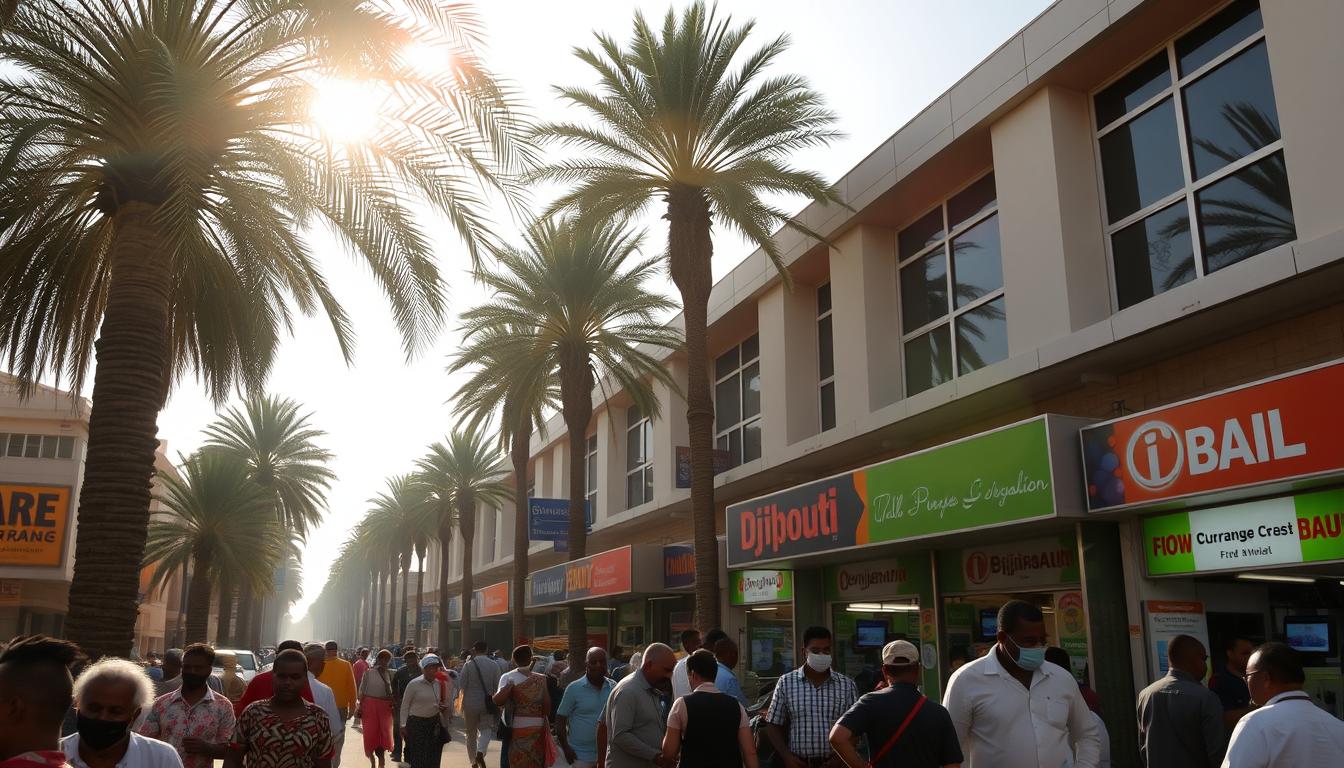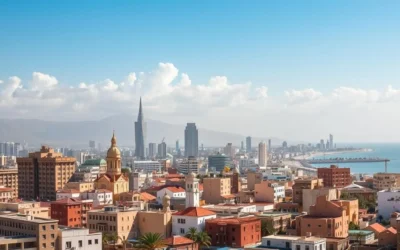✓ Accommodations ✓ Flights ✓ Rental Cars ✓ Tours & Activities
Did you know that over 60% of transactions in Djibouti are still conducted in cash? This makes understanding the local currency and payment methods essential for a smooth trip. The official currency is the Djiboutian Franc (DJF), and knowing how to manage it can save you time and money.
When traveling, it’s crucial to be aware of exchange rates and potential fees. Using a reliable travel card like Wise or Revolut can help you avoid unnecessary charges. These cards offer competitive rates and are widely accepted, making them a convenient option for everyday spending.
This guide will cover everything you need to know about managing your money abroad. From finding the best exchange rates to securing your funds, you’ll be well-prepared for your journey. Stay tuned for tips on using ATMs, exchanging currency, and more.
Understanding the Djiboutian Economy and Currency Overview
The Djiboutian Franc has a rich history tied to the region’s economic growth. Introduced in 1949, it replaced the French Franc and has since become a symbol of national identity. Its stability is largely due to being pegged to the US dollar at a fixed rate of 177.72 DJF to 1 USD. This peg ensures predictability for both locals and visitors.
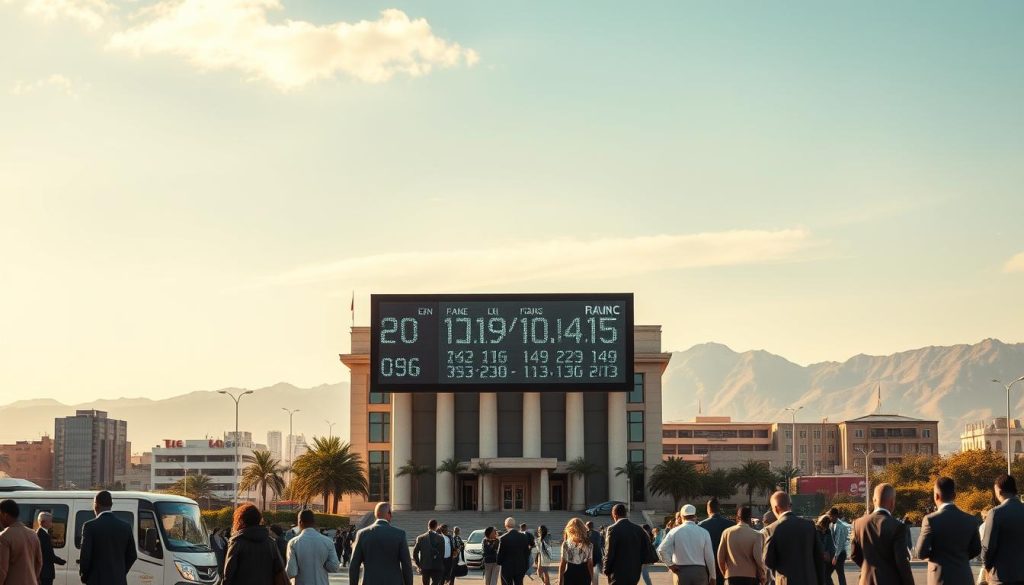
Today, the economy is driven by its strategic location and thriving port, which handles 90% of its trade. The services sector, including logistics and finance, contributes significantly to GDP. This economic structure impacts how money is managed daily, with cash still being the preferred method for many transactions.
Historical Context and Currency Significance
The Djiboutian Franc’s evolution reflects the country’s journey toward economic independence. Its peg to the US dollar has provided stability, making it a reliable medium for trade and commerce. This stability is crucial for businesses and travelers alike, as it minimizes risks associated with fluctuating exchange rates.
Current Economic Climate in Djibouti
Djibouti’s economy has seen robust growth, with a GDP increase of around 6.5% in recent years. Inflation remains moderate at 3.5%, ensuring price stability. However, challenges like a 10% unemployment rate highlight the need for continued economic development.
When planning your trip, understanding the local rate of exchange and availability of cash is essential. Banks and exchange bureaus are reliable options for converting your money. Additionally, ATMs are widely available in urban areas, though it’s wise to carry some cash for smaller transactions.
By grasping these economic nuances, you can better manage your money and enjoy a hassle-free experience. Whether you’re exchanging currency or withdrawing cash, a little preparation goes a long way.
Essential Currency Exchange Tips in Djibouti
Managing your money efficiently is key to a stress-free trip. Knowing where and how to exchange currency can save you time and avoid unnecessary fees. This section will guide you through the best practices for handling your finances during your travels.

Where to Exchange Currency
Banks are the most reliable option for exchanging currency. They offer competitive rates and are widely available in urban areas. Designated exchange centers are another great choice, especially for convenience. While airport bureaus are accessible, their rates are often less favorable.
Hotels may also provide exchange services, but their rates tend to be higher. It’s best to compare rates at multiple locations to ensure you get the best deal. Always keep receipts for every transaction to track your spending.
Best Practices for Transactions
Exchanging smaller amounts of currency at a time can minimize potential losses. This approach also reduces the risk of carrying large sums of cash. Use secure payment methods like travel cards for added safety.
Check current exchange rates before making any transactions. Apps and online tools can help you stay updated. Always inform your bank about your travel plans to avoid issues with card usage.
Avoiding Common Exchange Scams
Stay vigilant during currency exchanges to avoid scams. Be cautious of unofficial exchange providers offering rates that seem too good to be true. Stick to reputable banks and exchange centers to ensure secure transactions.
Count your money carefully before leaving the counter. If something feels off, don’t hesitate to ask questions. By staying informed and cautious, you can protect your finances and enjoy a hassle-free trip.
Using ATMs and Managing Cash in Djibouti
Accessing cash while traveling can make or break your experience. ATMs are a convenient way to manage your funds, but understanding their availability and fees is crucial. This guide will help you navigate the process smoothly and securely.
ATM Availability and Charge Considerations
ATMs are widely available in urban areas, especially in major tourist spots. However, in remote regions, they may be scarce. It’s wise to plan your withdrawals in advance to avoid running out of cash or paying high fees.
Most ATMs charge a fee for international transactions. These fees can vary, so it’s a good idea to check with your bank before traveling. Some banks offer low-cost ATM cards that minimize these charges, making them a great option for frequent travelers.
Tips for Safe Cash Withdrawals
Safety is paramount when withdrawing cash. Always choose well-lit, secure locations, preferably during daylight hours. Avoid using ATMs in isolated areas or those that look tampered with.
Here’s a quick guide to safe withdrawals:
- Use ATMs inside banks or shopping centers for added security.
- Check for skimming devices before inserting your card.
- Cover the keypad with your hand when entering your PIN.
- Limit the amount of cash you carry at any given time.
By following these tips, you can ensure your transactions are secure and hassle-free.
Minimizing Fees and Planning Strategically
Transaction fees can add up quickly, but there are ways to minimize them. Using a travel card like Revolut or Wise can help you avoid unnecessary charges. These cards offer competitive exchange rates and low fees, making them a smart option for managing your money.
Another way to save is by withdrawing larger amounts less frequently. This reduces the number of transactions and associated fees. Always check your bank’s withdrawal limits to plan accordingly.
| ATM Type | Typical Fees | Best Time to Use |
|---|---|---|
| Bank ATMs | $2-$5 per transaction | Business hours |
| Airport ATMs | $5-$10 per transaction | Early morning or late evening |
| Hotel ATMs | $3-$7 per transaction | Daytime |
Planning your withdrawals during peak safe hours can also save you time and stress. By staying informed and prepared, you can make the most of your travel budget and enjoy a seamless experience.
Cards for Travel: Credit, Debit, and Prepaid Options
Choosing the right travel card can make your international trips smoother and more cost-effective. With options like credit, debit, and prepaid cards, you can find a method that suits your needs. Each type offers unique benefits, from low fees to secure spending abroad.
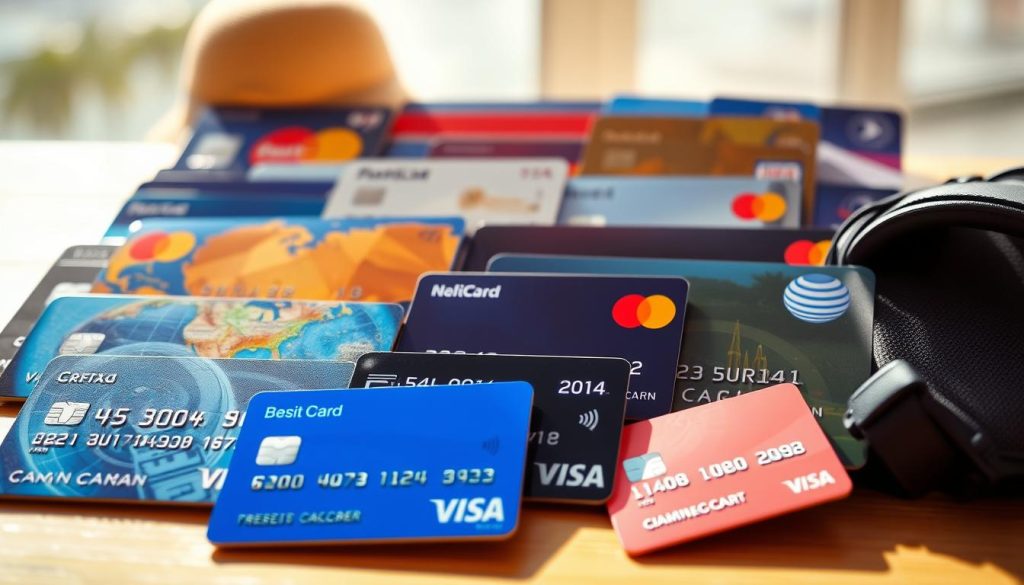
Comparing International Travel Cards
Popular travel cards like Wise, Chime, Monzo, and Netspend are designed for global use. These cards often feature no foreign transaction fees and mid-market conversion rates. This means you save on cost while enjoying competitive exchange rates.
Here’s a quick comparison of their key features:
| Card | Foreign Fees | Conversion Rate | Best For |
|---|---|---|---|
| Wise | None | Mid-market | Frequent travelers |
| Chime | None | Market rate | Budget-conscious users |
| Monzo | None | Mid-market | Digital nomads |
| Netspend | Low | Market rate | Prepaid card users |
When selecting a card, consider your travel plan and spending habits. For example, Wise is ideal for frequent travelers due to its low cost and multi-currency support. Chime, on the other hand, is great for those who want a simple, fee-free service.
Managing Your Card Usage
To protect your money, always monitor your transactions. Use secure apps provided by your card issuer to track spending. Inform your bank about your travel dates to avoid issues with card usage.
Here are some practical tips:
- Carry a backup card in case of emergencies.
- Use ATMs in secure locations to avoid skimming devices.
- Set spending limits to stay within your budget.
By choosing the right card and managing it wisely, you can enjoy a hassle-free trip. Whether you’re exploring new destinations or on a business trip, the right method can make all the difference.
Navigating Fees and Exchange Rates for a Smart Trip
Exchange rates and hidden fees can impact your travel budget significantly. Understanding how these factors work ensures you make informed decisions and save money. This section will guide you through the essentials of currency conversion and fee management.
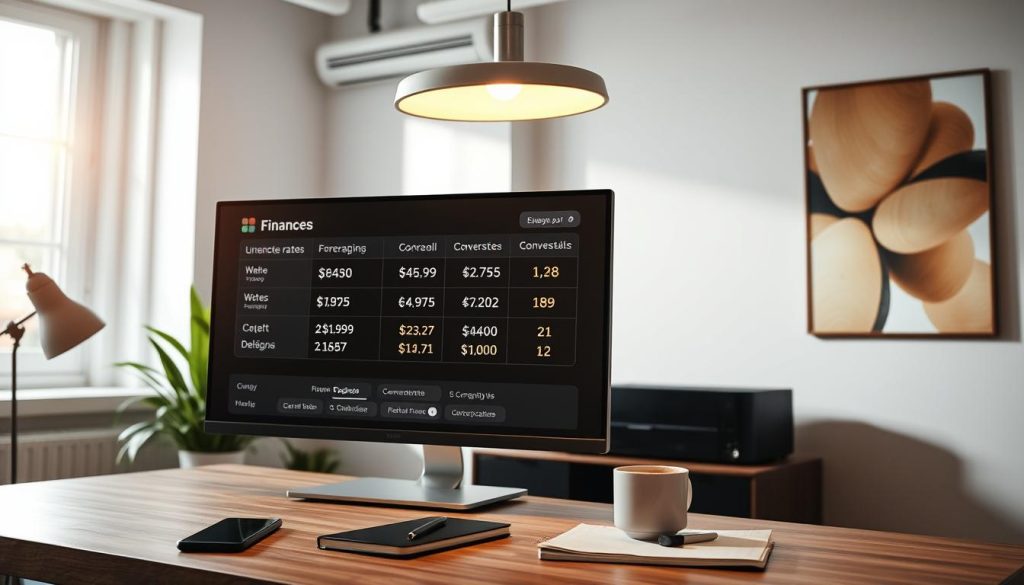
Understanding Conversion Rates
Currency conversion is the process of exchanging one currency for another. The rate at which this happens can vary widely depending on the provider. Mid-market rates, which are the real exchange rates without markup, are the most favorable. Travel cards like Wise and Revolut often offer rates close to this benchmark.
When exchanging cash, banks and exchange bureaus typically add a margin to the mid-market rate. This margin can range from 1% to 5%, so it’s essential to compare rates before making a transaction. Apps like XE and OANDA provide real-time data to help you stay informed.
Identifying Hidden Transaction Fees
Hidden fees can quickly add up, especially when using credit cards or ATMs abroad. Credit cards often charge 1% to 3% for foreign transactions, while ATM fees can range from $2 to $5 per withdrawal. Some banks also charge a percentage of the withdrawal amount, which can further increase costs.
To avoid these fees, consider using prepaid travel cards or multi-currency accounts. These options often have lower fees and better exchange rates. Always check the terms and conditions of your card to understand the charges involved.
Here’s a breakdown of common fees and how to minimize them:
| Fee Type | Typical Cost | How to Avoid |
|---|---|---|
| Credit Card Foreign Transaction Fee | 1%-3% | Use fee-free cards like Wise or Chime |
| ATM Withdrawal Fee | $2-$5 | Use bank ATMs or travel cards with low fees |
| Currency Conversion Margin | 1%-5% | Compare rates and use mid-market providers |
By staying mindful of your budget and monitoring your spending, you can avoid unnecessary costs. Compare provider rates and choose the most cost-effective options for your needs. This approach ensures you make the most of your travel funds and enjoy a hassle-free trip.
Djibouti: Ultimate Travelers Guide to Currencies & Payments
Crafting a smart payment plan can make your trip hassle-free and budget-friendly. Whether you’re dining at a local restaurant or exploring markets, having the right travel card or cash on hand matters. This section will help you balance local and global solutions for seamless transactions.
Local Services vs. Global Solutions
When traveling, you’ll encounter both local and global payment options. Local services, like cash transactions in djiboutian franc, are widely accepted and often preferred. However, global solutions like travel cards and credit cards offer convenience and security.
Here’s a quick comparison to help you decide:
| Option | Pros | Cons |
|---|---|---|
| Local Cash (DJF) | Widely accepted, no fees | Risk of theft, limited for large purchases |
| Travel Cards | Convenient, secure, low fees | May not be accepted everywhere |
| Credit Cards | Secure, rewards, easy tracking | Foreign transaction fees |
Practical Tips for Everyday Payments
For dining at local restaurants, cash in djiboutian franc is often the best choice. Many places add a 10% service charge, so tipping isn’t necessary but appreciated. For larger expenses, using a travel card or credit card can save you from carrying too much cash.
Here are some actionable tips:
- Carry a mix of cash and cards for flexibility.
- Use travel cards for competitive exchange rates.
- Inform your bank about your travel dates to avoid card issues.
By balancing local and global payment methods, you can enjoy a stress-free trip. Whether you’re shopping, dining, or exploring, a well-planned strategy matters for a smooth experience.
Optimizing Travel Budgets with Global Payment Solutions
Traveling smart means managing your money efficiently with modern tools. Mobile wallets and apps have revolutionized how we handle currency exchange and track expenses. These tools not only save time but also reduce extra transaction fees, making your trip more cost-effective.
Leveraging Mobile Wallets and Apps
Mobile wallets like Apple Pay and Google Pay are game-changers for travelers. They allow you to make secure payments without carrying cash. Apps associated with leading banks and visa-enabled cards offer real-time currency exchange rates and instant notifications on transaction fees. This helps you stay informed and avoid unnecessary charges.
Here’s how you can make the most of these tools:
- Use apps like Wise or Revolut for low-cost currency exchange and fee-free transactions.
- Enable instant notifications to track every payment and avoid overspending.
- Link your mobile wallet to a visa card for seamless global transactions.
Benefits of Global Payment Solutions
Global payment solutions simplify your travel experience. They eliminate the hassle of carrying multiple currencies and reduce the risk of theft. Leading banks and financial institutions offer competitive rates, ensuring you get the best value for your money.
Here’s a comparison of popular payment methods:
| Method | Pros | Cons |
|---|---|---|
| Mobile Wallets | Secure, convenient, low fees | Requires smartphone and internet |
| Travel Cards | Multi-currency support, low fees | May not be accepted everywhere |
| Credit Cards | Widely accepted, rewards | High foreign transaction fees |
By leveraging these tools, you can optimize your travel budget and enjoy a stress-free trip. Staying digitally connected ensures you’re always in control of your finances.
“The integration of AI-driven automation software is increasingly being adopted in travel and expense management.”
Explore travel apps with user-friendly interfaces for easy money management. These apps help you track expenses, monitor currency exchange rates, and plan your budget effectively. With the right tools, you can make every dollar count on your next adventure.
Planning for Diverse Travel Scenarios in Djibouti
Traveling to new destinations requires adapting your financial strategy to fit your unique needs. Whether you’re a budget traveler or seeking luxury, or exploring solo or with a group, your payment methods and currency management can make a big difference. This section will help you tailor your approach for a seamless experience.
Considerations for Budget and Luxury Travelers
Budget travelers often prioritize cost-effective solutions. Using debit cards or prepaid travel cards can help minimize fees. These options are ideal for daily expenses and smaller transactions. For luxury travelers, credit cards with travel rewards offer added benefits like lounge access and insurance coverage.
When managing local currency, budget travelers should focus on exchanging smaller amounts to avoid carrying too much cash. Luxury travelers, on the other hand, may prefer using cards for larger purchases to earn rewards and simplify tracking expenses.
Solo vs. Group Travel Payment Strategies
Solo travelers often have more flexibility in their payment choices. Carrying a mix of cash and cards ensures you’re prepared for any situation. For group travel, consider using a shared credit card for common expenses like meals or transportation. This simplifies splitting costs later.
In remote areas, cash is often the most reliable option. Make sure to withdraw enough local currency before heading to less accessible regions. For urban areas, cards are widely accepted, making them a convenient choice.
Here are some practical tips for managing your finances:
- Use debit cards for daily spending to avoid overspending.
- Carry a backup credit card for emergencies.
- Inform your bank about your travel dates to prevent card issues.
By tailoring your financial strategy to your travel style, you can enjoy a stress-free trip. Whether you’re exploring solo or with a group, a little planning goes a long way.
Conclusion
Planning your finances before a trip ensures a stress-free experience. This guide has covered essential strategies for managing your money, from using a debit card to exchanging the official currency wisely. Modern tools like travel cards and mobile apps can save you a lot of hassle and fees.
Remember to prepare a detailed payment plan before you travel. Use local ATMs responsibly and keep track of your spending. Reviewing this guide regularly will help you stay on top of your finances and enjoy a smooth journey.
Put these tips into practice for a seamless and enjoyable trip. With the right approach, you can focus on exploring without worrying about your budget.
The above is subject to change.
Check back often to TRAVEL.COM for the latest travel tips and deals.
